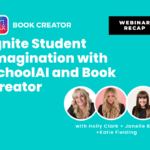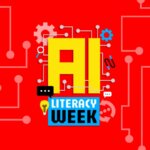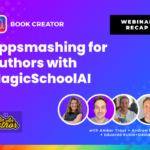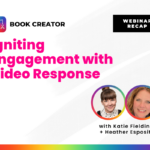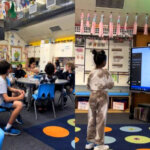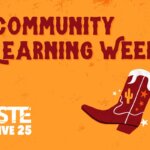Educators and innovators share how storytelling, creativity, and AI literacy come together to empower students with the skills they need for the future.
On Day 3 of AI Literacy Week, host David Hotler welcomed an inspiring panel to discuss how AI literacy connects with storytelling, creativity, and student empowerment. Joining him were Erlend Klouman Høiner, co-founder of We Will Write, Josie Wozniak, a classroom teacher and We Will Write ambassador, and Shannon Miller, Future Ready Librarian and well-known advocate for digital creativity. Together, they explored how schools can prepare students to use AI responsibly—while keeping human voices, stories, and judgment at the center.
Grab all slides, templates, and examples in one place →
AI Literacy through storytelling
Guests: Erlend Klouman Høiner (We Will Write), Josie Wozniak (We Will Write Ambassador), Shannon Miller (Future Ready Advocate)| Host: David Hotler
Erlend Klouman Høiner introduced We Will Write, a platform that helps students grow their writing confidence through collaboration and AI-supported feedback. His emphasis was clear: AI should never replace the writer—it should amplify their story.
Josie Wozniak shared how her own students leaned into this process, using the platform to workshop essays, refine arguments, and publish pieces for authentic audiences. Instead of AI being a shortcut, it became a supportive partner, helping students identify strengths and find ways to improve.
Shannon Miller connected these ideas back to the library space, where creativity and storytelling have always been essential. She highlighted how AI tools can broaden access—helping multilingual learners, supporting students with different needs, and opening more ways for learners to express themselves.
👉 Want to try it yourself? Jump into the AI Literacy Week Notebook
to access WeWillWrite challenges and companion Book Creator templates your students can start using right away.”
Why AI Literacy matters for every student
Guests: Holly Clark, Matt Miller, Ken Shelton, Yaritza Villalba, and Alana Winnick | Hosts: David Hotler
In the Day 3 panel our guests underscored one essential truth: AI literacy is not optional. Students who learn how to use AI thoughtfully and responsibly will step into the future with a clear advantage. Those who don’t risk being left behind—even in well-resourced districts.
The panelists shared four actionable takeaways for schools and educators:
- Blend AI concepts with core learning. Show students how AI works, what it does well, where it falls short, and how to use it ethically.
- Encourage questioning. Have students critique AI outputs: What’s missing? What biases show up? What requires citation?
- Set classroom norms. Be explicit about what’s allowed, what’s encouraged, and what’s off-limits—and model how to credit AI support.
- Engage families. Share your “why,” explain classroom rules, and highlight examples of positive AI use to build trust and partnership.
Keep the conversation going! Download the AI Literacy Week Notebook
for all the panel resources, discussion prompts, and strategies to bring AI literacy into your school community.
The Big Takeaway
David Hotler closed the session by reminding participants that AI literacy starts with teachers first. By building their own comfort, teachers can model curiosity, caution, and creativity for students.
.👉 Get every resource mentioned—from classroom templates to family discussion guides—inside the AI Literacy Week Notebook.
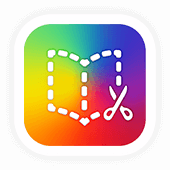
Get Book Creator for your school!
- Upgraded accounts for all your teachers
- Implementation plan to help with rollout
- PD support
- Analytics & admin dashboard
With 20 years of experience in education, Katie is passionate about creating inclusive and accessible classrooms for all students. She loves exploring new places, trying different foods, and connecting with fellow educators.



